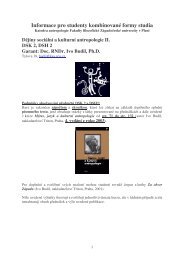BOB SCRIBNER Historical Anthropology of Early Modern Europe
BOB SCRIBNER Historical Anthropology of Early Modern Europe
BOB SCRIBNER Historical Anthropology of Early Modern Europe
You also want an ePaper? Increase the reach of your titles
YUMPU automatically turns print PDFs into web optimized ePapers that Google loves.
30 Bob ScribnerCook almost from the very beginning, revealing a long historiographywhich told and retold the story <strong>of</strong> the god Cook-Lono, sometimes forvery self-interested reasons, as in the case <strong>of</strong> the early missionaries wholabelled Cook as an idolator for accepting his designation as a god.Finally, he explores the patterns <strong>of</strong> violence and irrational behaviour inCook that, he argues, led to his death in an act virtually <strong>of</strong> resistance bythe increasingly terrorized Hawaiians. If Cook was deified after his death,this was the same dignity accorded by the Hawaiians to many greatchiefs 37 .The major issue highlighted in all this is the difficulty <strong>of</strong> recoveringthe 'native's point <strong>of</strong> view', even when the anthropologist sets out armedwith the best <strong>of</strong> intentions. It is still possible to end with a wholly falsifiedaccount, no more than 'the constructed understanding <strong>of</strong> the constructednative's constructed point <strong>of</strong> view' 38 . Obeyesekere's main interestis the personality <strong>of</strong> Cook, and he brings to his analysis an acute awareness<strong>of</strong> Cook's role as a bearer <strong>of</strong> terror and violence to the natives heencountered, sharpened by a sense <strong>of</strong> the questions <strong>of</strong> politics and powerinvolved, undoubtedly a consequence being himself, as a Sri Lankan, amember <strong>of</strong> a colonised people. In an article published around the sametime, he sharpened the critique by addressing the issue <strong>of</strong> cannibalism, apractice which had fascinated the ethnological curiosity <strong>of</strong> Cook andother <strong>Europe</strong>ans penetrating the Pacific in the eighteenth century 39 .Through a carefully nuanced reading <strong>of</strong> the explorers' accounts <strong>of</strong> nativecannibalism, Obeyesekere showed that the <strong>Europe</strong>ans, by closely questioningand demanding practical pro<strong>of</strong> from the natives about their allegedcannibalistic practices, drew upon themselves the natives' fear thatit was the <strong>Europe</strong>ans who were really cannibals. Moreover, the <strong>Europe</strong>anobsession with the issue created a discourse to which the natives reactedboth by exploiting the notion <strong>of</strong> cannibalism for their own purposes (to37 Gananath Obeyesekere, The Apotheosis <strong>of</strong> Captain Cook: <strong>Europe</strong>an Mythmaking inthe Pacific (Princeton, N.J., 1992).38 The description used by Crapanzo (as note 22), Hermes Dilemma, p. 67, in his critique <strong>of</strong> Geertz's classic analysis <strong>of</strong> the Balinese cockfight, but equally applicable toreadings <strong>of</strong> the Cook story.39 Gananath Obeyesekere, 'Britische Kannibalen'. Nachdenkliches zur Geschichte desTodes und der Auferstehung des Entdeckers James Cook, Historische Anthropologie1 (1993), 273-93; the essay originally appeared in Critical Inquiry 18 (1992),630 - 54.







